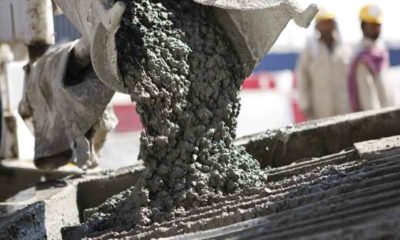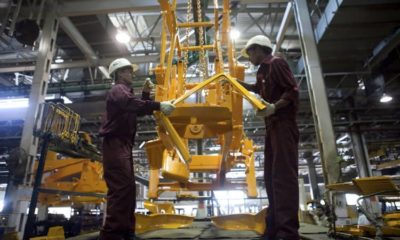The Manufacturers Association of Nigeria (MAN) has said that Nigeria’s macroeconomy and manufacturing operating environment were buttressed by the marginal recovery of some key manufacturing indicators allowed a gradual improvement in the fourth quarter (Q4) of 2021.
In its Manufacturers CEOs Confidence Index (MCCI) Q4 report, the President of the association, Mr. Mansur Ahmed clarified that although changes in almost all manufacturing indicators as measured in the report are still not as desired, the fourth quarter performance is better than what was obtained in the 2021 Q3.
The MCCI is an index set up by MAN to measure changes in the quarterly pulsation of manufacturing activities in relation to movement in the macroeconomy and government policies. The Index is considered as MAN’s barometer used to aggregate the views of CEOs of manufacturing companies on changes in the economy.
In the report, Ahmed stated that manufacturers’ resilience, seasonal transactions, and passive policy support sustained manufacturing in the quarter despite the prevalence of familiar and emerging excessive tax-related challenges faced by manufacturers.
The manufacturing sector in Q4 of the year under review, overall recorded a mixed grilled performance occasioned by meagre improvement in the operating environment indices and macroeconomic ambiance evidenced by the high points. This he said, cumulatively triggered the increase in the aggregate MCCI score for the quarter to 55.4 points from 54.0 points recording the preceding quarter.
“Manufacturing performance is still below the mark,” Ahmed explained, saying, “notwithstanding the marginal improvement in the operating environment during the quarter under review, as the sector is still plagued by numerous familiar constraints. Some of these challenges enumerated by manufacturers are clearly presented in this report.”
The president further advised the government to implement mechanisms such as providing incentives to encourage investments in raw materials, pharmaceutical and petrochemical materials, iron and steel, etc. He also beckoned on the government to specifically provide security to lives and investments in industrial areas.
“In order to improve the performance of the sector, the government needs to intentionally put in place a mechanism that will address these challenges permanently by considering and implementing the following recommendation:
“Further incentivize investment in the development of raw materials locally through the Backward Integration and Resource-based industrialization initiates. Government should call for more investors to key into these initiatives with appropriate and definite incentives.
“For instance, there is need for urgent investment and production of Active Pharmaceutical Ingredients (API) in the country; investment and production of machines; iron and steel; petrochemical materials, etc to support manufacturing activities.
“Give specific attention to the security of life and investment in industrial areas; properly delineate and upscale security infrastructure in the various industrial areas in the country, particularly in the northern part of the country for priority attention. Government should also quickly invest in modern security such as drones, cameras, etc. for robust monitoring of the areas,” Ahmed stated.
The MAN president in the MCCI report stressed the need to ensure effective allocation of available foreign exchange to productive sectors, especially to the manufacturing sector for the importation of raw materials and vital machines and equipment that are not available locally.
He also buttressed the need for the government to expressly direct the Central Bank of Nigeria (CBN) to consult with the Ministries of Industry Trade & Investment and effectively engage MAN on measures to improve forex supply to manufacturing concerns.
He said that the Ministry of Science Technology and Innovation should be directed to inaugurate the Secretariat that will implement the strategies for the Executive Order and the Standard Organisation of Nigeria (SON). The Secretariat will designate local manufacturers of LPG (Liquefied Petroleum Gas) Gas Cylinders as priority provider of the 10 million Cooking Gas Cylinders to be procured by the government for 12 States in the federation.
Ahmed added, “Return milk and other dairy products to the National list in the fiscal policy guidelines to maintain consistency with the Backward Integration Programme, which has spurred heavy investments in the dairy production.
“Unify academic curriculum with industrial skill needs and requirements to guarantee the sustainable development of skilled manpower for the industries. Government should as a matter of urgency synchronize the curricular of tertiary institutions, particularly the Polytechnics with the skills requirements of industries. The various government vocational and training centers should also be re-engineered to offer those skills that are needed by the industries.
“Revisit the resuscitation of the existing national refineries to produce fuels locally, embark on the rehabilitation of major highway corridors, improve trade facilitation infrastructure and deepen the ongoing development of rails system to change the narrative on the operating environment from being a high cost to low production cost environment.”
On electricity, Ahmed said there is a need to sustain the eligible customer initiative to ensure that more power is supplied to the manufacturing sector.
The Manufacturing Association of Nigeria in its Index Report, further adviced the government to, “Strengthen the Bank of Industry (BOI) and Bank of Agriculture (BOA) to adequately provide liberal finance for the manufacturing sector;
“Monitor the implementation of Executive Order 003 to ensure compliance by MDAs so as to boost activities in the manufacturing sector, Publish the list of approved harmonized taxes and levies for the manufacturing sector by the Joint Tax Board (JTB) to address the issues of multiples taxes and levies.
“Rationalize Government Ministries, Departments, Agencies, parastatal and Commissions to resolve the issues of over-regulation and duplication; Improve the time taken to clear machines and raw-materials at the national ports while making the link road accessible.”

 Forex3 weeks ago
Forex3 weeks ago



 Naira2 weeks ago
Naira2 weeks ago
 Billionaire Watch2 weeks ago
Billionaire Watch2 weeks ago




 Naira2 weeks ago
Naira2 weeks ago




 Naira2 weeks ago
Naira2 weeks ago






 Naira4 weeks ago
Naira4 weeks ago


 Naira1 week ago
Naira1 week ago






 Naira4 weeks ago
Naira4 weeks ago






















